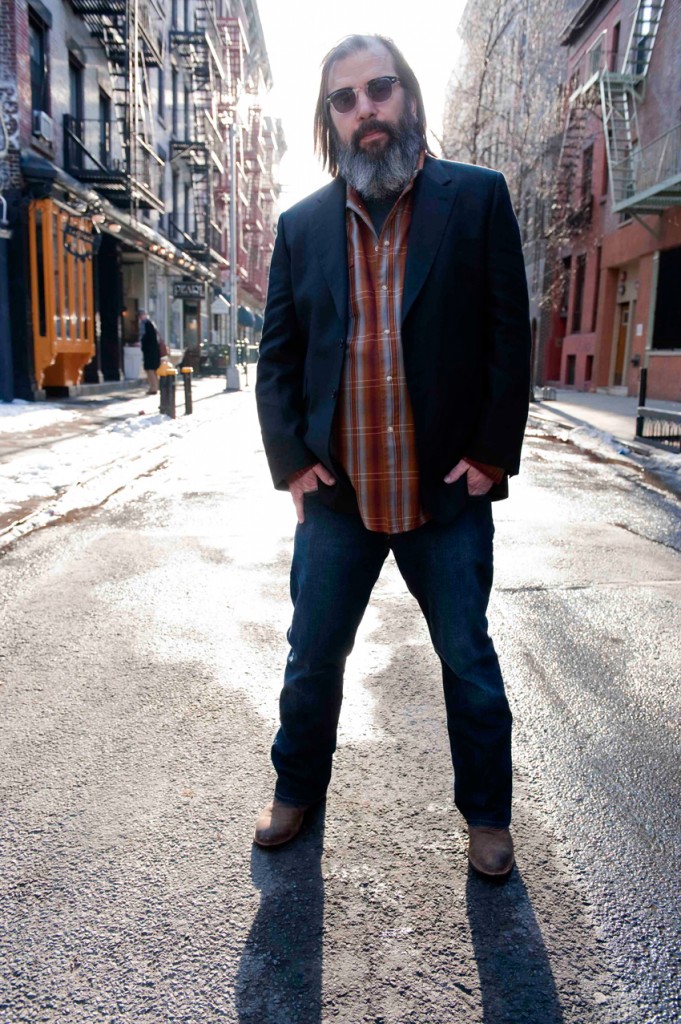[UPDATED] Last week, the Emmy nominations were announced and HBO’s Treme received two—a Best Director nomination for Agnieszka Holland for the first episode, and Best Song for Steve Earle for “This City.”
“I wish the show had gotten more nominations,” Steve Earle said Friday by phone. “I think The Wire was a great show and deserved to be nominated more than it was, and I think this was a great show and deserved to be nominated more than it was.”
At the moment, the song is unavailable, but it will be on the Treme soundtrack and his next album, which will be produced by T Bone Burnett. He recorded the song at Piety Street Recording with Burnett and arrangements by Allen Toussaint. It was his first time working with Toussaint, so he called Joe Henry, who produced The River in Reverse and The Bright Mississippi. “He said, ‘Get ready’ and he was right,” Earle says. “It was an amazing experience.”
According to Earle, producer David Simon asked him to write a song that his character, street musician Harley, would have written in 2005. “I’ve written stuff for films before, but this is one of the best songs I’ve ever written,” Earle says. “You’re assuming a character when you write any song in the first person, but I don’t believe everything that John Walker Lindh says in ‘John Walker’s Blues,’ either. It was okay with Allen and the other musicians when we recorded it at Piety.”
Earle is hardly a stranger to New Orleans. In his wilder days in Houston, there were nights that started there and ended in the Crescent City. “The bars closed at 2, and there was a 25 percent chance you’d go from there to New Orleans,” he says. When he left Houston, he passed on the nearest music capitols—Austin and New Orleans—and moved to Nashville. “In Austin, the girls were too pretty and the weather was too good and I knew I’d never get anything done in a place like that,” he says. “As it was, I got in enough trouble living in relative austerity in Nashville. If I moved to New Orleans, I’d be dead, no doubt about it.”
His character, Harley, is based on a friend who played guitar on Royal Street, Frank Schaap. “All we know about Harley is that he’s not local, but he’s knowledgeable. He’s southern, but he may not be from Louisiana. He’s a Royal Street guy. He drifted there, but he’s stuck, and he’s been there long enough to have seniority on the corners. There was a time when there was a definite pecking order to all of that.”
As part of his preparation for Harley, Earle had to create his battered guitar. “That’s a brand new Martin guitar that we fucked up to look like that,” he says, laughing. “The water stains are duck sauce from Suzy’s Chinese on Bleeker Street. We antiqued it and then painted ‘This Machine Floats’ on top, which was my idea at the last minute.”
For Earle, the street music culture is an essential part of what makes New Orleans special, and the community “understands that you’ve made a commitment to making something out of nothing, whether it’s visual art or music,” he says. “The world is going to come there, so that increases your chances of making a living out of that. I know people that play on Royal Street who play there because they make more money there than playing club dates. The guys who come to play on the streets of New Orleans are professional musicians.”
[youtube]http://www.youtube.com/watch?v=Quk7Bmoqbjw&NR=1[/youtube]
Earle has been in a good position to track the recovery of New Orleans. He played the House of Blues when touring 2004’s The Revolution Starts Now, then he returned in 2006 for the Future of Music Coalition’s retreat, and he started coming to New Orleans last year again to film Treme.
“It’s coming back in a way that I don’t think I expected,” he says. “The things I most feared happening to New Orleans hadn’t happened yet. They hadn’t managed to grab all the land and turn it into Disneyland.” As part of the FMC retreat with Tom Morello, Mike Mills and Earle’s wife, Allison Moorer, he toured the Lower Ninth Ward and Gentilly and feared that dispossessed families would lose the houses that had been in families for years.
“I thought, ‘They’re going to be able to pull this off.’ This is all property that’s been in families for generations. The taxes were relatively low, and there’s no way they’re going to be able to hang on to this. That’s come true in some instances, but more people than I thought have been able to hang on and stay. [New Orleans is] trying to continue to be the things about that I think are important. It’s a big part of who we are culturally and as a people. You can’t overestimate its importance.”
As for the show, “I watch every week because I don’t know what’s going to happen. I only know what happens on one page either side of my scene. I don’t get complete scripts. Most of the people I’ve talked to in New Orleans think we’ve got something right, and that’s the coolest part of it.”
Update July 13, 8:55 a.m.
The YouTube video of Treme‘s closing credits with “This City” was added.





